人教版英语必修三教案
人教版高中英语必修三unit3教案
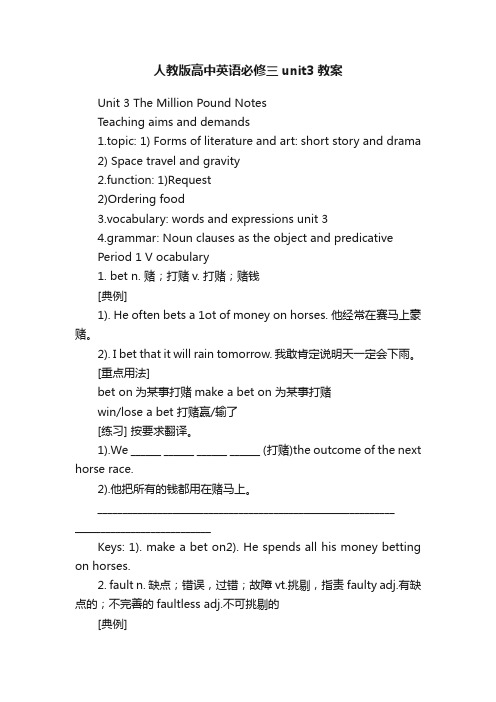
人教版高中英语必修三unit3教案Unit 3 The Million Pound NotesTeaching aims and demands1.topic: 1) Forms of literature and art: short story and drama2) Space travel and gravity2.function: 1)Request2)Ordering food3.vocabulary: words and expressions unit 34.grammar: Noun clauses as the object and predicativePeriod 1 V ocabulary1. bet n. 赌;打赌v. 打赌;赌钱[典例]1). He often bets a 1ot of money on horses. 他经常在赛马上豪赌。
2). I bet that it will rain tomorrow. 我敢肯定说明天一定会下雨。
[重点用法]bet on为某事打赌make a bet on 为某事打赌win/lose a bet 打赌赢/输了[练习] 按要求翻译。
1).We ______ ______ ______ ______ (打赌)the outcome of the next horse race.2).他把所有的钱都用在赌马上。
______________________________________________________________________________________Keys: 1). make a bet on2). He spends all his money betting on horses.2. fault n. 缺点;错误,过错;故障vt.挑剔,指责faulty adj.有缺点的;不完善的faultless adj.不可挑剔的[典例]1). I like him despite his faults. 虽然他有种种缺点, 但我仍然喜欢他。
人教版高中英语必修三Unit3Grammar教案全面版
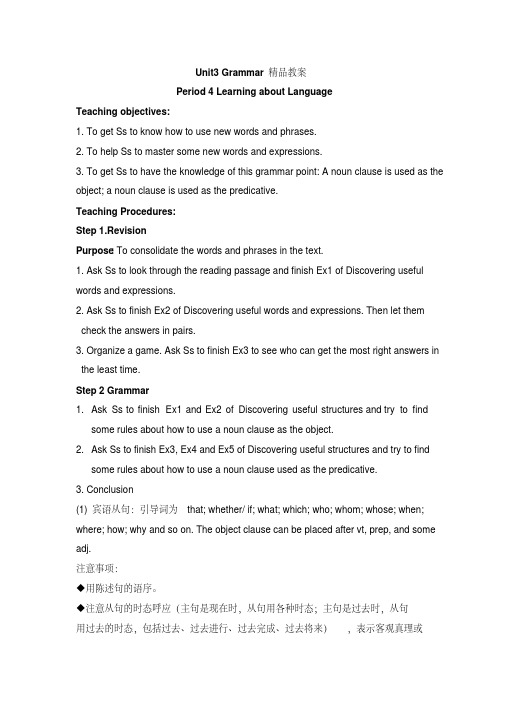
Unit3 Grammar精品教案Period 4 Learning about LanguageTeaching objectives:1. To get Ss to know how to use new words and phrases.2. To help Ss to master some new words and expressions.3. To get Ss to have the knowledge of this grammar point: A noun clause is used as the object; a noun clause is used as the predicative.Teaching Procedures:Step 1.RevisionPurpose: To consolidate the words and phrases in the text.1. Ask Ss to look through the reading passage and finish Ex1 of Discovering useful words and expressions.2. Ask Ss to finish Ex2 of Discovering useful words and expressions. Then let them check the answers in pairs.3. Organize a game. Ask Ss to finish Ex3 to see who can get the most right answers in the least time.Step 2. Grammar1.Ask Ss to finish Ex1 and Ex2 of Discovering useful structures and try to findsome rules about how to use a noun clause as the object.2.Ask Ss to finish Ex3, Ex4 and Ex5 of Discovering useful structures and try to findsome rules about how to use a noun clause used as the predicative.3. Conclusion(1) 宾语从句:引导词为that; whether/ if; what; which; who; whom; whose; when; where; how; why and so on. The object clause can be placed after vt, prep, and some adj.注意事项:◆用陈述句的语序。
人教版必修三英语第三单元教案TalkingaboutPhysicalAppearance
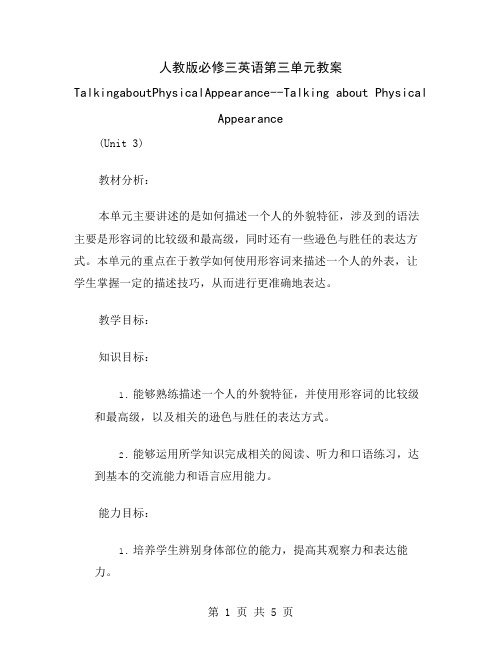
人教版必修三英语第三单元教案TalkingaboutPhysicalAppearance--Talking about PhysicalAppearance(Unit 3)教材分析:本单元主要讲述的是如何描述一个人的外貌特征,涉及到的语法主要是形容词的比较级和最高级,同时还有一些逊色与胜任的表达方式。
本单元的重点在于教学如何使用形容词来描述一个人的外表,让学生掌握一定的描述技巧,从而进行更准确地表达。
教学目标:知识目标:1.能够熟练描述一个人的外貌特征,并使用形容词的比较级和最高级,以及相关的逊色与胜任的表达方式。
2.能够运用所学知识完成相关的阅读、听力和口语练习,达到基本的交流能力和语言应用能力。
能力目标:1.培养学生辨别身体部位的能力,提高其观察力和表达能力。
2.提高学生的英语听、说、读、写的能力,使其能够流利地进行英语口语交流。
情感目标:1.培养学生树立正确的审美观和人生价值观,使其能够尊重不同的文化和不同的人。
2.鼓励学生在语言学习中发扬创新思维,锻炼自我表达的勇气和能力。
教学重点:1.形容词比较级、最高级和逊色与胜任的表达方式的掌握。
2.学生口语表达能力的培养和提高。
教学难点:1.如何正确运用形容词比较级、最高级和逊色与胜任的表达方式。
2.如何培养学生英语口语表达的能力,提高其英语听、说、读、写的能力教学设计:一.课前准备 ( Pre-task preparation)1.教师准备相关的物品,以便于学生在描述一个人的外貌时有具体的东西可以参考。
2.让学生阅读相关的课文,了解相关的语言点和表达方式。
二.引入 (Introduction)1.教师可以通过播放一段视频或者是展示图片,引入对话题的思考。
2.教师可以介绍一些有趣的人物,引入本节课的主要内容。
三.新课教学 (New content)1.形容词的比较级和最高级 (Comparative and superlative adjectives)a.讲解基本的用法和规则。
人教版必修三英语第一单元整套精品教案
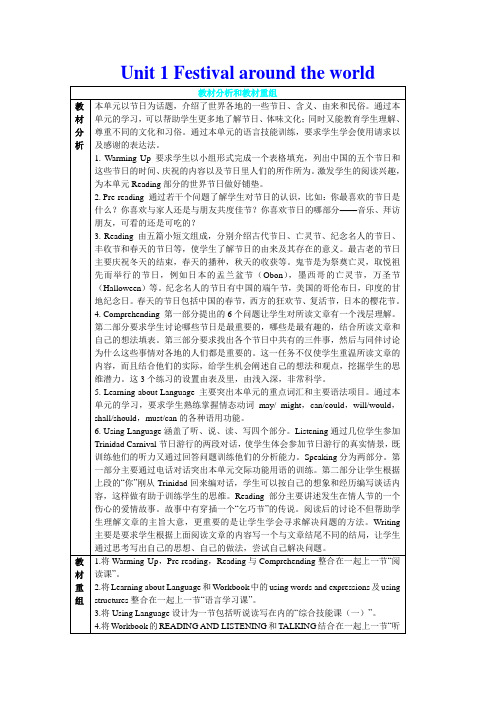
Unit 1 Festival around the worldPart 1: Teaching Design(第一部分:教学设计)Period 1: A sample lesson plan for reading(FESTIV ALS AND CELEBRATIONS)AimsTo help students develop their reading abilityTo help students learn about festivalsProceduresI. Warming upWarming up by discussingGood morning, class. Today we are going to read about FESTIV ALS AND CELEBRATIONS. But first, I’d like to have you work in groups and list five Chinese festivals that you know. When do they take place? What do they celebrate? And what do people do at that time?Warming up by watching and listeningHi, every one. Look at the photos and listen to me telling you about some Western Festivals.Some Western FestivalsValentine’s Day , February 14 情人节Candy, flowers and other tokens of affection are exchanged on thisday, in honor of two martyrs, both named St. Valentine.April Fool’s Day, April 1 愚人节Franksters feel that it is permissible to playall sorts of tricks on this day.Mother’s Day 母亲节The second Sunday in May, set aside to honor mothers.Father’s Day 父亲节The third Sunday in June, set aside to honor fathers.Halloween , October 31 万圣节A special day for making merry, wearingcostumes and playing old-fashioned games. Afavorite with children.Easter 复活节A Christian holy day in March or April when Christiansremember the death of Christ and his return to life.Thanksgiving Day 感恩节Generally the fourth Thursday in November, set aside fornational thanksgiving, especially for our democratic formof government. It is a legal holiday in all states.Labor’s Day 劳动节The first Monday in September. Set aside to honor labor, it is a legalholiday in all states.Christmas Day, December 25 圣诞节This is both a legal and religious holiday, it observesthe anniversary of the birth of Jesus. All states andall those of the Christian faith celebrate this holiday.Warming up by learning vocabularyTurn to page 96, and go over the vocabulary list for Unit 1. Find out the relationship between the spelling and the pronunciation.II. Pre-reading1. Imagining and sharingHello! Now you can celebrate everyday!Everyday is a holiday. Imagine somewhere someone is celebrating right now. Our world is filled with mystical celebrations and powerful memories. Come and tell the class what holiday it is today.2. Talking and sharingWork in groups of four. Tell your group mates what festivals or celebrations you enjoy in your city or town.III. Reading1. Listening to the recordingNow please listen to the recording of the text FESTIV ALS AND CELEBRATIONS. Pay attentionto the pronunciation of each word and the pauses within each sentence. I will play the tape twice.2. Reading and underliningNext you are to read and underline all the useful expressions or collocations in the passage. CopyAs you have read the text, you can surely tell which sentences are difficult to understand. Now put your questions concerning the difficult points to me.IV. Closing down by doing exercisesTo end the lesson you are to do the comprehending exercises No. 1, 2 and 3 on page 3.Closing down by learning the text by heartIn the last few minutes you are asked to learn the text by heart. You may make use of the table you10. “The interest be divided into five parts, according to the agreement made by both sides,” declared the judge. (2004重庆)A. mayB. shouldC. mustD. shall11. —Could I have a word with you, mum? (2006浙江)— Oh dear, if you ________.A. canB. mustC. mayD. should12.You can’t imagine that a well-behaved gentleman ___ be so rude to a lady. (2001上海)A. mightB. needC. shouldD. would13. How ___ you say that you really understand the whole story if you have covered only part ofthe article? (2003上海)A. canB. mustC. needD. may14. —Do you know where David is? I couldn’t find him anywhere. (2005湖北)—Well. He ___have gone far—his coat’s still here.A.shouldn’t B.mustn’t C.can’t D.wouldn’t15.—Excuse me, but I want to use your computer to type a report.(2004湖南)—You have my computer if you don't take care of it.A. shan'tB. might notC. needn'tD. shouldn't【巩固练习】1.You are wet through.You ___ in the rain.A. must comeB. must have caughtC. may catchD. must have got caught2. I thought you ___ like something to read,so I have brought you some books.A.may B.might C.could D.must3. —I stayed at a hotel while in New York.—Oh, did you?You ___ with Barbara.A.could have stayed B.could stay C.would stay D.must have stayed4. —When can I come for the photos?I need them tomorrow afternoon.—They ___ be ready by 12:00.A.can B. should C.might D.need5. We ___ last night,but we went to the concert instead.A.must have studied B.might study C.should have studied D.would study6. I was on the highway when this oar west past followed by a police car. They ____ at least 150 kilometers an hour. (2005重庆)A. should have been doingB. must have been doingC. could have doneD. would have done7. —The room is so dirty.____ we clean it?(2003北京)—Of course.A.Will B.Shall C.Would D.Do8. Mr. White _____ at 8:30 for the meeting, but he didn’t show up. (2004全国-03)A. should have arrivedB. should arriveC. should have had arrivedD. should be arriving9. I often see lights in that empty house. Do you think I _____ report it to the police? (2004广西)A. shouldB. mayC. willD. can10. — Who is the girl standing over there? (2004天津)— Well, if you know, her name is Mabel.A. mayB. canC. mustD. shall【汉译英】Period 2: A sample lesson plan for Learning about Language (Modal verbs: may/ might, can/ could, will/ would, shall/should, must/ can)AimsTo help students learn about Modal verbsTo help students discover and learn to use some useful words and expressionsTo help students discover and learn to use some useful structuresProceduresI. Warming upWarming up by discovering useful words and expressionsTurn to page 4 and do exercises No. 1, 2 ,3, 4 and 5 first. Check your answers against your cl assmates’.II. Learning about grammar1. Reading and findingTurn to page 1 and read the text of FESTIV ALS AND CELEBRA TIONS. As you read, find out examples of may/ might, can/ could, will/ would, shall/ should, must/ can used in the sentences. 2. Doing exercises No. 1, 2 and 3 on page 5Turn to page 5 and do the exercises No. 1,2 and 3 in groups of four.III. Closing down by doing a quizTo end the period you are going to take a quiz on modal verbs: can, could, may and mightUse one of the modal verbs in brackets to fill each gap:(Answers:1~5 might, may, Could, could, Can;6~10:may, can’t, couldn’t, could, might)Period 3: A sample lesson plan for Using Language(A SAD LOVE STORY)AimsTo help students read the passage A SAD LOVE STORYTo help students to use the language by reading, listening, speaking and writingProceduresII. ListeningThere is a big and famous carnival in Trinidad every February. Li Mei and Wu Ping are there. Listen to the tape and answer the questions on page 6.III. SpeakingYou have visited America and you have returned home to China. You are phoning your friend in1. Reading and underliningNext you are to read and underline all the useful expressions or collocations in the passage A SAD2. SpeakingTurn to page 8 and with a partner, find the answers to the questions:①Why did Li Fang feel like a fool? →Because he was alone and heart-broken.②What was Li Fang afraid that Hu Jin was doing? →She could be with her friends laughing athim.③How did Li Fang know the manager wanted to shut the coffee shop? →He saw the manager wipe the tables, sit down and turn on the TV.④Why do people want the weather to be fine on Qiqiaojie? →Because if it rains Zhinu would weep and the couple wouldn’t be able to meet.⑤What is the reason why Li Fang and Hu Jin did not meet on time? →For Li Fang had gone to the wrong place to meet Hu Jin. They should meet at the tea shop.⑥Why was Li Fang so worried at the end of the story? →Because he had no gifts for Hu Jin.3. ActingNext we are going to put the text A Sad Love Story on stage, that is, to play the story.IV. Guided writing1. Writing an imagined and different ending to the story of Li Fang, beginning with:As he sadly passed the tea shop on the corner on his way…2. Writing a descriptionTo inform the foreigners of the Chinese culture, you are to write a description of Qiqiaojie in English. You may begin like this:Love story for this day is about the 7th daughter of Emperor of Heaven and an orphaned cowherd. They were separated by the Emperor. The 7th daughter was forced to move to the star Vega and the cowherd moved to the star Altair. They were allowed to meet only once a year on the day of 7th day of 7th lunar month.V. Further applying1. Finding informationGo to the library to read or get online to search in order to find more information on festivals and celebrations. Take notes of your findings and report them to your group mates next period.2. Writing lettersWrite a letter either to Zhinu or Niulang, telling about the modern life and the modern love.VI. Closing downClosing down by filling a formTo end this period, I am going to ask you to write a short passage to describe to the class the two stars of Vega and Altair which are related to Qiqiaojie, the Chinese V alentine’s Day.I.教学内容分析本单元的中心话题是“节日”,主要讲述了不同地区不同种类的节日。
英语必修3人教版新课标unit1教案(usinglanguage)
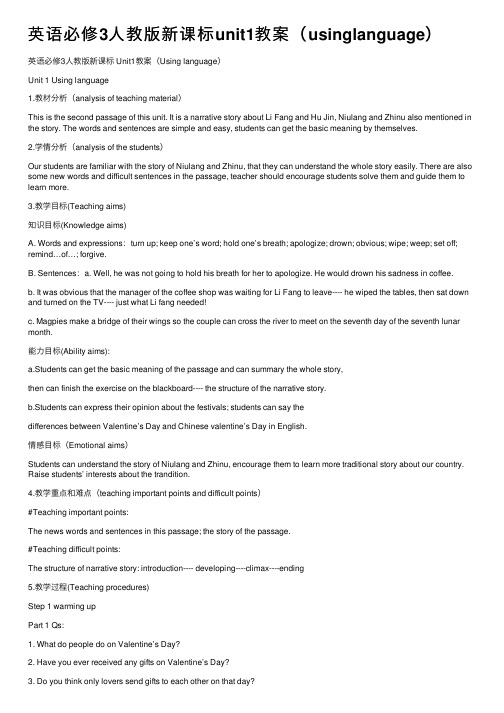
英语必修3⼈教版新课标unit1教案(usinglanguage)英语必修3⼈教版新课标 Unit1教案(Using language)Unit 1 Using language1.教材分析(analysis of teaching material)This is the second passage of this unit. It is a narrative story about Li Fang and Hu Jin, Niulang and Zhinu also mentioned in the story. The words and sentences are simple and easy, students can get the basic meaning by themselves.2.学情分析(analysis of the students)Our students are familiar with the story of Niulang and Zhinu, that they can understand the whole story easily. There are also some new words and difficult sentences in the passage, teacher should encourage students solve them and guide them to learn more.3.教学⽬标(Teaching aims)知识⽬标(Knowledge aims)A. Words and expressions:turn up; keep one’s word; hold one’s breath; apologize; drown; obvious; wipe; weep; set off; remind…of…; forgive.B. Sentences:a. Well, he was not going to hold his breath for her to apologize. He would drown his sadness in coffee.b. It was obvious that the manager of the coffee shop was waiting for Li Fang to leave---- he wiped the tables, then sat down and turned on the TV---- just what Li fang needed!c. Magpies make a bridge of their wings so the couple can cross the river to meet on the seventh day of the seventh lunar month.能⼒⽬标(Ability aims):a.Students can get the basic meaning of the passage and can summary the whole story,then can finish the exercise on the blackboard---- the structure of the narrative story.b.Students can express their opinion about the festivals; students can say thedifferences between Valentine’s Day and Chinese valentine’s Day in English.情感⽬标(Emotional aims)Students can understand the story of Niulang and Zhinu, encourage them to learn more traditional story about our country. Raise students’ interests about the trandition.4.教学重点和难点(teaching important points and difficult points)#Teaching important points:The news words and sentences in this passage; the story of the passage.#Teaching difficult points:The structure of narrative story: introduction---- developing----climax----ending5.教学过程(Teaching procedures)Step 1 warming upPart 1 Qs:1. What do people do on Valentine’s Day?2. Have you ever received any gifts on Valentine’s Day?3. Do you think only lovers send gifts to each other on that day?Part 2 : Do we have our own Valentine’s Day in China?Qiqiaojie (乞巧节) ---- the seventh day of the seventh lunar monthWell-known poem: Eternal love between us two, Shall withstand the time apart (两情若是久长时,⼜岂在朝朝暮暮。
人教版高二年级英语必修三教案

人教版高二年级英语必修三教案【导语】高二年级有两大特点:一、教学进度快。
一年要完成二年的课程。
二、高一的新鲜过了,距离高考尚远,最容易玩的疯、走的远的时候。
导致:心理上的迷茫期,学业上进的缓慢期,自我束缚的疏松期,易误入歧路,大浪淘沙的挑选期。
因此,直面高二的挑战,认清高二,认清高二的自己,认清高二的任务,显中意义十分重大而迫切。
作者高二频道为你整理了《人教版高二年级英语必修三教案》,期望对你的学习有所帮助!【教案一】教学准备教学目标Teaching AimsKnowledge a nd Skills:1. Ge t to know about Canada.2.Grasp some reading skills.3.Stimulate the Ss’ interest and love for learning about foreign countries.Strategy and Method:1.Train the students’fast-reading ability.2.Train the students’ ability to co operate with others.教学重难点Main points :1. Introduce the information of Canada to the students.2.Train the students’reading ability —skimming,and listening abilityDifficult point :Learn different reading skil ls for different reading purposes.Teaching procedures and ways教学进程Step1. Readin g&Greeting (2`)Step2. Leading in and Warming Up (5`)1.Free talk: Do you like to go sightseeing?Which country do you like to visit?What can you see in these countries?2.QuizStep3. Fast- reading (10`)1.what is“the true north”?It refers to “the cross-Canada train.”2.Draw the route of the two girls’ traveling across CanadaStep4. Careful- reading(T&F) (15`)Step5. Consoli dation (7`)Listening & SummaryFill in the blank and retell the story课后习题HomeworkSurf the Internet to find more information about CanadaChalkboard DesigningUnit5Canada –the “the true north”-----A thip “ on the true north”Vancouver Rocky Mountains Thunder BayCalgary Lake Superior Toronto【教案二】教学准备教学目标1. 教学目标(1)知识目标:学生能掌控下列重点单词和短语的意义和用法:greet, represent, approach, expression, defend, misunderstand, adult, cheek, major, likely, in general。
人教版高中英语必修三全套教案
Module3 Unit 1 Festivals around the worldTeaching aims and demands1.topic: 1>Festivals2> how festivals begin3>how to celebrate festivals2.function: 1>RequestEg: Could you please…?Could I have …? I look forward to doing…2>ThanksEg: It’s a pleasure. /Don’t mention it.It’s very kind of you to…I’d love to …Thank you very much./Thanks a lot.You are most welcome.3.vocabulary:4.grammar:Jin can speak English well. (ability)Could you please show me the way to …? (request)May we see the awards for the team? (permission)She might give you … (possibility)The whole family will come for dinner. (promise)Often he would dress up like a rich man. (pass habit)We would be there with our friends. (promise)II.Key pointsPeriod 1-2 Warming up and fast reading1.Greetings2.Warming upStep 1 discussing the following questionsa.How was your holiday/spring festival?b.Did you go traveling?c.How much pocket money did you get?Step 2 talking1). Name some festivalsSpring Festival Dragon Boat Festival Lantam Festival Mid-Autumn Festival Army Day May Day Teachers’ Day New Year National Day Mother’s Day Children’s Day Father’s D ay Christmas Day Halloween carnival Easter Valentine Day Oben2).Ss work in groups of four and list five Chinese festivals and siscuss when theytake place , what they celevrate and one thing that people do at that time. Festivals Time of year/date Celebrate for Things to do Mid-Autumn DaySpring FestivalDragon Boat DayTomb sweeping DayLantern Festival3.Pre-reading1) What’s your favourite holiday of the year? Why?2) What festivals or celebration do you enjoy in your city or town? Do you likespending festivals with your family or with friends? What part of a festival do you like best—the music, the things to see, the visits or the food?4. Fast reading and find the answers to the following questions.A.What did ancient festivals celebrate?B.What are festivals of the dead for ?C.Why are autumn festivals happy events ? three things people do at spring festival ?Period 3-4 Intensive reading1.Read the passage paragraph and find the main ideas of each paragraphParagraph 1: All kinds of celebration in ancient time.Paragraph 2: The purpose to honour the dead and three examplesFestivals Time Things people doObenDay of the DeadHalloweenParagraph 3: The reasons Why we honour peopleFestivals Who does it celebrate ?Dragon Boat FestivalsClumbus DayIndian National FestivalParagraph 4: Autumn festivals are happy eventsParagraph 5: How people celebrate in spring festivals2.Language pointsa.They would starve if food was difficult to find…starve (v.)饿死;挨饿eg. Millions of people starved to death during the war.Starve for sth 渴望…Eg. The homeless children starve for love.Starvation (n.) 饿死Eg. Die of starvationStarvation wages 不够维持基本生活的工资b.The most ancient festivals would celebrate the end of the cold weather, plantingin spring and harvest in autumn.Celebrate (vt./vi.) 庆祝,赞颂,赞美,举行(仪式)Eg.We celebrate the new year with a party.Their courage was celebrated in all the newspaper.Celebrated (adj.) = famous 著名的,驰名的c. …because they thought these festivals would bring a year of plenty.days/years/…of plenty :富裕(尤指事物和钱)的日子,年月,生活等。
人教版英语必修三教案
人教版英语必修三教案【篇一:人教版英语必修3全套教案】人教版英语必修3 unit1-5 教案unit 1 festivals around the worldteaching aims and demands1.topic: 1festivals2 how festivals begin3how to celebrate festivals2.function: 1requesteg: could you please…?could i have …?i look forward to doing…2thankseg: it?s a pleasure. /don?t mention it.it?s very kind of you to…i?d love to …thank you very much./thanks a lot.you are most welcome.3.vocabulary:4.grammar: 情态动词的用法jin can speak english well. (ability)coul d you please show me the way to …? (request)may we see the awards for the team? (permission)she might give you … (possibility)the whole family will come for dinner. (promise)often he would dress up like a rich man. (pass habit)we would be there with our friends. (promise)ii.key pointsperiod 1 warming up and fast reading1.greetings2.warming upstep 1 discussing the following questionsa.how was your holiday/spring festival?b.did you go traveling?c.how much pocket money did you get?step 2 talking1). name some festivalsspring festival dragon boat festival lantam festival mid-autumn festivalarmy day may day teachers? daynew year national day mother?s daychildren?s day father?s daychristmas day halloween carnivaleaster valentine day oben2).ss work in groups of four and list five chinese festivals and siscuss when they take place , what they celevrate and one thing that people do at that time. then fill in the blanks.festivals time of year/date celebrate for things to domid-autumn dayspring festivaldragon boat daytomb sweeping daylantern festival3.pre-reading1) what?s your favourite holiday of the year? why?2) what festivals or celebration do you enjoy in your city or town? do you like spending festivals with your family or with friends? what part of a festival do you like best—the music, the things to see, the visits or the food?4. fast reading and find the answers to the following questions.a.what did ancient festivals celebrate?b.what are festivals of the dead for ?c.why are autumn festivals happy events ? three things people do at spring festival ?period 2-3 intensive reading1.read the passage paragraph by paragraph and find the main ideas of each paragraphparagraph 1: all kinds of celebration in ancient time.paragraph 2: the purpose to honour the dead and three examplesfestivals time things people doobenday of the deadhalloweenparagraph 3: the reasons why we honour peoplefestivals who does it celebrate ?dragon boat festivalsclumbus dayindian national festivalparagraph 4: autumn festivals are happy eventsparagraph 5: how people celebrate in spring festivals2.language pointsa.they would starve if food was difficult to find…starve 〔v.〕饿死;挨饿eg. millions of people starved to death during the war.starve for sth 渴望?eg. the homeless children starve for love.starvation (n.) 饿死eg. die of starvationstarvation wages 不够维持基本生活的工资b.the most ancient festivals would celebrate the end of the cold weather, planting in spring and harvest in autumn.celebrate (vt./vi.) 庆祝,赞颂,赞美,举行〔仪式〕eg.we celebrate the new year with a party.their courage was celebrated in all the newspaper.celebrated (adj.) = famous 著名的,著名的c. …because they thought these festivals would bring a yearof plenty.days/years/?of plenty :富裕〔尤指事物和钱〕的日子,年月,生活等。
(完整版)人教版高中英语必修三第三单元教案
interest, the teacher can hold a competition among them.教学重点1. Develop students’ reading and speaking skills.2. Let students read and act the play.3. Have students learn to use the expressions t o order food.教学难点1. Enable students to learn to use reading strategies such as skimming, scanning, and so on.2. Get students to act the play.3. Have students make a dialogue at the restaurant.三维目标知识与技能目标1. Get students to learn some useful new words and expressions in this part.2. Get students to read the play.3. Let students learn the expressions of ordering food.过程与方法目标1. Develop students’ reading skills and enable them to learn how to use different reading strategies to read different reading materials.2. Enable student s to understand and act out the play.3. Have students learn how to use the expressions to order food.情感态度与价值观目标1. Stimulate students’ interests of learning English by reading and acting this play.2. Develop students’ sense of group cooperation and teamwork.四、教学方法Problems probing method. Work in groupsMake a quiz for the students to find out how much they already know about Mark Twain, Ask students to answer questions by groups. The questions are as follows:1.What was the real name of Mark Twain?2.What was his job?3.Can you name one of his famous novels?五、教学过程→Step 1 Revision1. Check the homework exercises.2. Ask some students to read the words of U3.→Step 2 Warming up1. Ask students to make a list of all the changes that Henry has made to his life.2. Have them in pairs discuss what difference they think this will make to the way people treat him and report their ideas to the class.3. Learn more about Mark Twain. Then list some popular novels such as The Adventures of TomSawyer, The Prince and the Pauper. [百度知道]→Step 3 Brief introduction of The million pound note[百度知道]Step 4 listen to the tape1. Ask the all turn to Page 17. We are going to listen to ActⅠ, Scene 3.2. Let them listen carefully and write down the main idea.3. Play the tape again to check and have the correct answers.→Step 5 Reading and speaking task1. Ask students to discuss the following questions in pairs.1) Where did Henry come from?2) Why was Henry in London?3) What happened to Henry?→Step5 See the movie [百度知道]Let a group retell the story and start a role play.→Step 6 Think overDo you know the exchange rate between pound and RMB?[百度知道]→Step 6 Homework1. Finish the Workbook exercises.2. Review the contents of the unit and complete Summing Up on Page 24.六、教学反思这篇课文很有挖掘、开发的价值,通过the waiter和老板的语言、动作、神态等描写,细致刻画出两个市井人物的见钱眼开、惟利是图的丑恶嘴脸。
人教版 高中英语必修第三册 Unit 1 教案
必修三第一单元Why do we celebrate festivals?一、文本分析这是一篇说明文,从不同的侧面对节日进行说明。
第一段首先介绍节日的起源有季节、宗教、著名人物、重要事件,接着介绍节日的共性特点:分享快乐、感激、爱、和平等。
第二段举例说明全世界共同庆祝的节日丰收节的庆祝时间、原因和主要活动,同时举例说明古代埃及、现代欧洲和中国庆祝丰收节的情况。
第三段介绍习俗在节日形成中扮演着重要角色,但随着社会的发展,一些习俗逐渐消失,同时也产生些新的习俗,以中国春节为环保而禁止燃放鞭炮和万圣节变成了孩子的娱乐节日为例说明。
第四段介绍节日商业化现象。
最后一段说明节日的重要性和意义。
从节日的起源、共性特点、发展、重要性和意义等方面介绍节日,理解节日的文化内涵,比较节日的异同,让学生了解不同民族文化习俗与传统节日,拓宽国际视野,增强祖国意识和跨文化交际能力。
二、设计理念“问题链·导学”模式是以“为什么要庆祝庆祝节日?”这一问题为中心开展教学。
通过节日情境创设,把学生引导到提出问题、分析问题、感悟问题的活动中来。
让学生基于节日主题语境,通过学习理解、迁移创新等体现综合性、关联性等特点的英语学习活动,围绕标题为什么要庆祝节日展开,提炼庆祝原因,在分析问题和解决问题过程中,促进自身语言知识学习、语言技能发展、文化内涵理解、多元思维发展。
三、本堂课特色1.创设节日情境,激发阅读动机;2.围绕教学目标,借力思维导图,理清语篇思路,使文本信息结构化;3.以问题链为支架,深度阅读,融入语言,优化思维发展,探讨庆祝节日的原因;4.回归标题,针对“festival”首字母,回归课文,再次提炼庆祝节日的意义,升华主题。
四、教学目标1.获取段落大意,梳理节日的起源、共性特点、发展等信息;2.描述中外节日异同,理解不同节日的重要性;3.分析和总结庆祝节日的原因;4.写一篇介绍清明节的应用文。
五、教学步骤Step1:学习理解类活动1. 围绕主题创设情境,铺垫语言以临近的清明节为导入,Why do we celebrate Tomb Sweeping Day? How do we celebrate it?Step2:概括、梳理、整合信息1. 寻找段落大意总结阅读技巧。
- 1、下载文档前请自行甄别文档内容的完整性,平台不提供额外的编辑、内容补充、找答案等附加服务。
- 2、"仅部分预览"的文档,不可在线预览部分如存在完整性等问题,可反馈申请退款(可完整预览的文档不适用该条件!)。
- 3、如文档侵犯您的权益,请联系客服反馈,我们会尽快为您处理(人工客服工作时间:9:00-18:30)。
人教版英语必修三教案【篇一:人教版英语必修3全套教案】人教版英语必修3 unit1-5 教案unit 1 festivals around the worldteaching aims and demands1.topic: 1festivals2 how festivals begin3how to celebrate festivals2.function: 1requesteg: could you please…?could i have …?i look forward to doing…2thankseg: it?s a pleasure. /don?t mention it.it?s very kind of you to…i?d love to …thank you very much./thanks a lot.you are most welcome.3.vocabulary:4.grammar: 情态动词的用法jin can speak english well. (ability)coul d you please show me the way to …? (request) may we see the awards for the team? (permission) she might give you … (possibility)the whole family will come for dinner. (promise)often he would dress up like a rich man. (pass habit) we would be there with our friends. (promise)ii.key pointsperiod 1 warming up and fast reading1.greetings2.warming upstep 1 discussing the following questionsa.how was your holiday/spring festival?b.did you go traveling?c.how much pocket money did you get?step 2 talking1). name some festivalsspring festival dragon boat festival lantam festival mid-autumn festivalarmy day may day teachers? daynew year national day mother?s daychildren?s day father?s daychristmas day halloween carnivaleaster valentine day oben2).ss work in groups of four and list five chinese festivals and siscuss when they take place , what they celevrate and one thing that people do at that time. then fill in the blanks.festivals time of year/date celebrate for things to domid-autumn dayspring festivaldragon boat daytomb sweeping daylantern festival3.pre-reading1) what?s your favourite holiday of the year? why?2) what festivals or celebration do you enjoy in your city or town? do you like spending festivals with your family or with friends? what part of a festival do you like best—the music, the things to see, the visits or the food?4. fast reading and find the answers to the following questions.a.what did ancient festivals celebrate?b.what are festivals of the dead for ?c.why are autumn festivals happy events ? three things people do at spring festival ?period 2-3 intensive reading1.read the passage paragraph by paragraph and find the main ideas of each paragraphparagraph 1: all kinds of celebration in ancient time.paragraph 2: the purpose to honour the dead and three examplesfestivals time things people doobenday of the deadhalloweenparagraph 3: the reasons why we honour peoplefestivals who does it celebrate ?dragon boat festivalsclumbus dayindian national festivalparagraph 4: autumn festivals are happy eventsparagraph 5: how people celebrate in spring festivals2.language pointsa.they would starve if food was difficult to find…starve (v.)饿死;挨饿eg. millions of people starved to death during the war.starve for sth 渴望?eg. the homeless children starve for love.starvation (n.) 饿死eg. die of starvationstarvation wages 不够维持基本生活的工资b.the most ancient festivals would celebrate the end of thecold weather, planting in spring and harvest in autumn.celebrate (vt./vi.) 庆祝,赞颂,赞美,举行(仪式)eg.we celebrate the new year with a party.their courage was celebrated in all the newspaper.celebrated (adj.) = famous 著名的,驰名的c. …because they thought these festivals would bring a yearof plenty.days/years/?of plenty :富裕(尤指事物和钱)的日子,年月,生活等。
eg.you have a life of plenty, what would you be worried about ?d.some festivals are held to honour the dead, or satisfy and please the ancestors, who could return either to help or to do harm.1)honour (v.) “尊敬,给?增光” honour sb. (sth.) with sth.(n.)“荣誉,光荣,敬意,面子”win honour for? 为?争光show honour to sb. 尊敬某人in honour of sb.(sth.) = in sb.’s /sth’s honour出于对某人的敬意 eg.there will be a party in honour of his success.为庆祝他的成功将会举行一个晚会。
we have a party in honour of the famous artist.为纪念这位著名艺术家我们举办了这场晚会。
2)satisfy (vt.)使满意,令人满意eg.that answer won?t satisfy her.那个答案不会使她满意。
satisfied (adj.)满意的(主语是人)satisfactory (adj.) 令人满意的(主语是事而不是人)satisfying (adj.)令人满意的(主语是事)satisfaction (n.)满意eg. she?s satisfied with her son?s progress.对于儿子的进步她感到很满意。
do you think what he said is satisfying?你认为他所见的令人满意吗?3)harm (n.) (u) 伤害eg. don?t be too serious , he meant no harm.(v.) harm sb./sth.=do harm to sb./sth.eg. don?t be afraid, the dog won?t harm you.what you do should do more good than harm.你所做的应该利大于弊。
the dead.in memory of / to the memory of sb. 最为对某人的纪念,纪念某人eg.the museum was built in memory of the famous scientist.f.they dress up and try to frightened people.dress n. 连衣裙/v. dress sb./oneself 给?穿上衣服eg. the first thing she does every morning after getting up is to dress her son.她每天起来第一件事就是帮儿子穿衣服。
